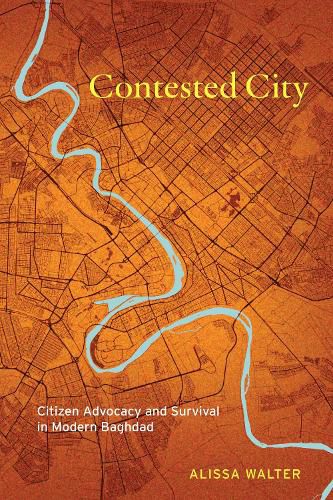Readings Newsletter
Become a Readings Member to make your shopping experience even easier.
Sign in or sign up for free!
You’re not far away from qualifying for FREE standard shipping within Australia
You’ve qualified for FREE standard shipping within Australia
The cart is loading…






Contested City offers a history of state-society relations in Baghdad, exploring how city residents managed through periods of economic growth, sanctions, and war, from the oil boom of the 1950s through the withdrawal of US troops in 2011. Interactions between citizens and their rulers shaped the social fabric and political realities of the city. Notably, low-ranking Ba'th party officials functioned as crucial intermediaries, deciding how regime policies would be applied. Charting the social, economic, and political transformations of Iraq's capital city, Alissa Walter examines how national policies translated into action at the local, everyday level.
With this book, Walter reveals how authoritarian governance worked in practice. She follows shifts in mid-century housing and urban development, the impact of the Iran-Iraq and Gulf Wars on city life, and the manipulation of food rations and growth of black markets. Reading citizen petitions to the government, Walter illuminates citizens' self-advocacy and the important role of low-ranking party officials and state bureaucrats embedded within neighborhoods. The US occupation and ensuing sectarian fighting upended Baghdad's neighborhoods through violent displacement and the collapse of basic state services. This power vacuum paved the way for new power brokers, including militias and neighborhood councils, to compete for influence on the local level.
$9.00 standard shipping within Australia
FREE standard shipping within Australia for orders over $100.00
Express & International shipping calculated at checkout
Contested City offers a history of state-society relations in Baghdad, exploring how city residents managed through periods of economic growth, sanctions, and war, from the oil boom of the 1950s through the withdrawal of US troops in 2011. Interactions between citizens and their rulers shaped the social fabric and political realities of the city. Notably, low-ranking Ba'th party officials functioned as crucial intermediaries, deciding how regime policies would be applied. Charting the social, economic, and political transformations of Iraq's capital city, Alissa Walter examines how national policies translated into action at the local, everyday level.
With this book, Walter reveals how authoritarian governance worked in practice. She follows shifts in mid-century housing and urban development, the impact of the Iran-Iraq and Gulf Wars on city life, and the manipulation of food rations and growth of black markets. Reading citizen petitions to the government, Walter illuminates citizens' self-advocacy and the important role of low-ranking party officials and state bureaucrats embedded within neighborhoods. The US occupation and ensuing sectarian fighting upended Baghdad's neighborhoods through violent displacement and the collapse of basic state services. This power vacuum paved the way for new power brokers, including militias and neighborhood councils, to compete for influence on the local level.